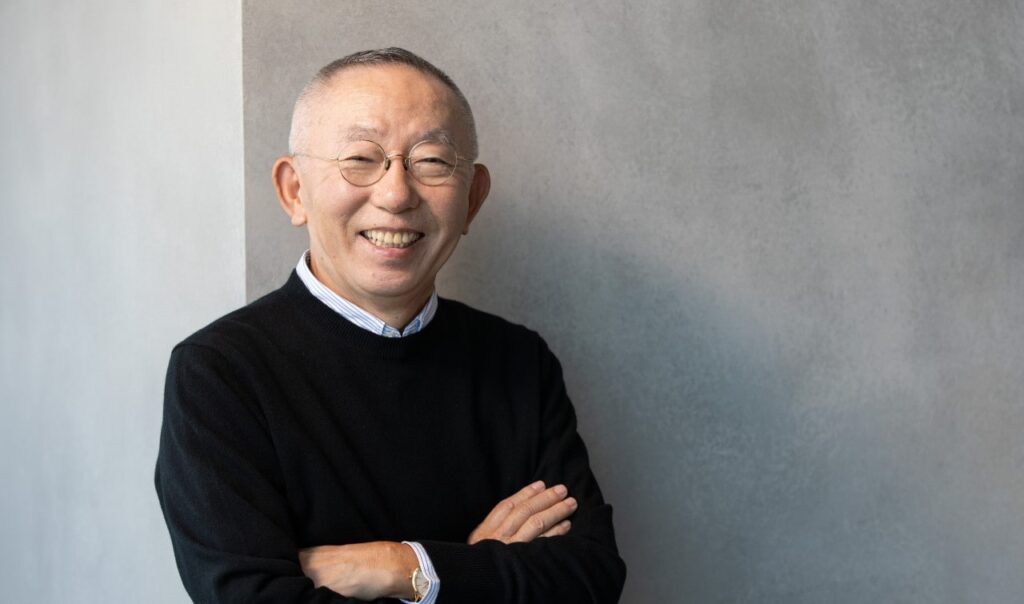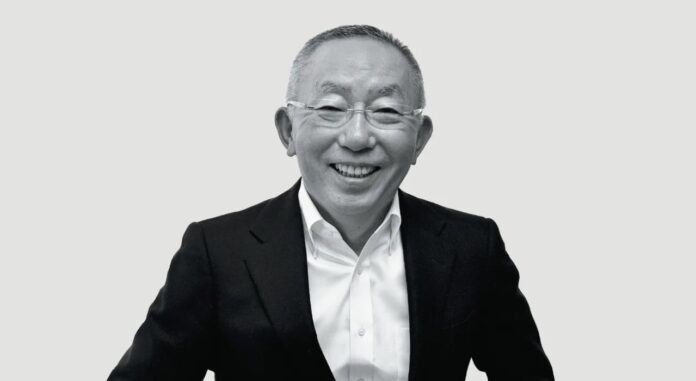As of 2024, Tadashi Yanai, the founder and CEO of Uniqlo’s parent business, Fast Retailing, is expected to be worth $35 billion. He turned a modest family business into a multinational fashion conglomerate, making him the richest person in Japan. Under his direction, Uniqlo grew globally and faced competition from companies such as Zara and H&M. As Fast Retailing enters new markets, Yanai’s wealth keeps increasing. Even with his enormous riches, he is still committed to fashion innovation and sustainability. His position as one of the most prosperous businessmen in the world has been solidified by his vision and business savvy.
Table of Contents
Tadashi Yanai’s Wife & Children: A Family Behind the Empire
Teruyo Yanai, Tadashi Yanai’s wife, has been at his side while he has grown Fast Retailing into a major force in the world of fashion. Kazumi and Koji Yanai, the couple’s two sons, also work in the family company. Even though Yanai doesn’t talk about his personal life, his boys are anticipated to be important to Uniqlo’s and its parent company’s future. Despite his enormous riches, Yanai appreciates discipline and hard work, which he has taught his kids. His success in the international retail sector is still largely attributed to his family.
Early Life and Education
On February 7, 1949, Tadashi Yanai was born in Ube, Yamaguchi Prefecture, Japan. His family operated Ogori Shoji, a modest clothing company that would eventually become Uniqlo, when he was growing up. Before entering the family firm in 1972, Yanai worked for a short time at a trade company after graduating from Waseda University with a degree in political science and economics. His early experience to the retail industry influenced his comprehension of consumer demands and market dynamics.
The Birth of Uniqlo
Yanai brought a novel idea to the Japanese fashion business in 1984 when he founded the first Unique Clothing Warehouse (later renamed as Uniqlo) in Hiroshima: premium, reasonably priced, and useful apparel. He aimed to establish a company that provided affordable, trendy clothing that was straightforward, drawing inspiration from Western retail models such as Zara and Gap.
Uniqlo took control of the whole supply chain, from design to production and retail, by using the SPA (Speciality store retailer of Private-label Apparel) model. This strategy laid the groundwork for Uniqlo’s quick growth by enabling it to retain excellent quality at affordable costs.
Expansion and Global Success
Uniqlo became a household name in Japan by aggressively expanding during the 1990s and early 2000s. But Yanai’s real goal was to rule the world. With varying initial outcomes, the business ventured into China, South Korea, and the United States. Nonetheless, the 2010s saw a very successful strategy move towards Asian and European markets.
Some key milestones in Uniqlo’s global journey include:
- 2001: First store in China, now one of Uniqlo’s largest markets.
- 2007: expansion into Europe, beginning in the United Kingdom.
- 2010: strong expansion in key cities after entering the U.S. market.
- 2014: declared its intention to compete with premium labels by opening its flagship shop in Paris.
- 2019: strengthened its hegemony in Japan by opening its biggest shop in the Ginza neighbourhood of Tokyo.
Today, Uniqlo has hundreds of outlets across more than 25 countries and makes billions of dollars a year.
Innovation and Business Philosophy
Tadashi Yanai’s concept and leadership style have been crucial to Uniqlo’s success. Among the crucial elements are:
1. Lifewear Concept – Uniqlo specialises on creating well-made, practical apparel for daily use. Uniqlo places a higher value on classic, long-lasting clothing than fast fashion companies that adhere to fads.
2. Technology and Fabrics – The company makes significant investments in textile research, including materials like AIRism (for breathability) and Heattech (for warmth). These developments set Uniqlo apart from rivals.
3. Data-Driven Decision Making – Big data and artificial intelligence are used by Uniqlo to forecast customer demand and streamline supply networks.
4. Efficient Supply Chain – Uniqlo collaborates with high-quality yet reasonably priced suppliers to keep prices down without sacrificing product quality.
Tadashi Yanai: The Entrepreneur Who Revolutionized Retail

Uniqlo is now a top brand in the industry because to Tadashi Yanai’s transformation of fast retail into a worldwide fashion powerhouse. He stands out as one of the most significant corporate executives in Japan and internationally due to his strategic vision, emphasis on innovation, and dedication to sustainability. He is still the richest person in Japan with a net worth of $35 billion, yet he is pushing for further growth and innovation. His influence on the future of reasonably priced, superior fashion goes beyond his financial success. Yanai’s impact on the global retail sector will last for many generations as his business expands.



